Maya Customary Land Rights Discussed in San Pedro, Columbia
On Sunday afternoon in southern Belize, the Ministry of Indigenous People’s Affairs, along with representatives of the Attorney General’s Ministry, convened a meeting with residents of San Pedro, Columbia to discuss the Draft Maya Customary Land Policy. The public consultation was the first since the last time that a similar session was held in Punta Gorda on January twenty-seventh. The village is one of many recognized as an indigenous community in Toledo District, however, a majority of residents are not in favor of communal land. They attended the meeting, heard what was presented by the government officials and shared their views on what is being proposed. Here’s News Five’s Isani Cayetano with that story.
Isani Cayetano, Reporting
A customary land policy is important because it recognizes and validates traditional land rights and uses. It is necessary for ensuring tenure security, promoting sustainable practices, reducing conflicts, and facilitating development. A policy also provides a framework for sustainable land management practices that balance environmental, social, and economic needs. In southern Belize, the government has been meeting with various communities, including the village of San Pedro, Columbia, where representatives held their latest public consultation.
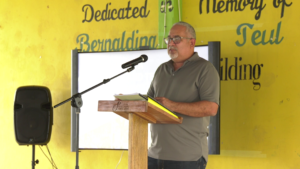
Andrew Marshalleck
Andrew Marshalleck, S.C., Attorney-at-law
“The Consent Order and the decision by Chief Justice Conteh back in 2008 both recognize that the rights of the Maya people to use land in the ways that they have customarily and historically used land is protected under the constitution. The form of protection it gets is that these rights, they constitute intangible property and the constitution protects this right to property.”
San Pedro, Columbia remains undecided when it comes to communal land rights. It is one of few Maya villages still on the fence regarding that controversial issue.
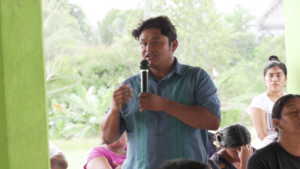
Resident 1
Resident 1, San Pedro, Columbia
“If we choose to go communal, it means that all those leases, all those titles are lost and it means that all the work that we’ve done on those farmlands is also lost because it becomes communal property. My question would be, what mechanism or mechanisms are envisioned to ensure that there is equitable distribution within the communal system because if you noh like somebody and you responsible fi distribute land, we know how that can go. And so, the becomes very important.”
The implementation of that Consent Order as mandated by the Caribbean Court of Justice, in affirming the decision of the Supreme Court, has been a long drawn-out process. It has also been a divisive course of action.
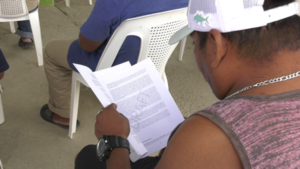 Andrew Marshalleck S.C.
Andrew Marshalleck S.C.
“There’s a system for the state to recognize and certify where ownership lies and what it is saying is that in operating that system, you have to have regard to other people who are within those spaces and some fair way of deciding has to be established as to who gets what when more than one person is claiming the same space, even when it’s the village claiming that space. And the primary, the primary criteria for deciding those issues is who is in fact there using it.”
Customary land policies help secure land tenure for indigenous and local communities, which can lead to improved stewardship of the land and natural resources. Nonetheless, the idea of owning it collectively does not sit well with everyone.
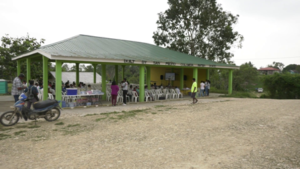 Resident 1
Resident 1
“If it is for everybody, it is for nobody. So I think that in Columbia, there is already a system where people recognize who owns which piece, we respect that already and, therefore, I am asking, let us consider it very keenly because if we make the wrong decision then we’re going back to square one and all the investments that we have all made on our lands could potentially be lost.”
Clear policies on customary land rights can help prevent disputes over land use and access to natural resources. During the meeting held on Sunday, the question was raised whether past alcaldes of San Pedro, Columbia gave consent on behalf of the community to join as an interested party in the matter that was before the CCJ.
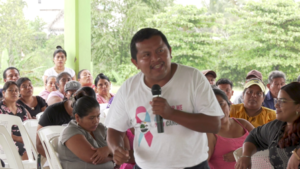 Resident 2, San Pedro, Columbia
Resident 2, San Pedro, Columbia
“Has the government come across any affidavit signed by any alcalde of this community indicating that they are onboard with this case presented to the CCJ? And I can attest to it that Jorge Coc, the then alcalde at that time when all these things were coming up, did not sign. Brother Sylvestre Caal did not sign. If they did it, it was solely on their own without public consultation.”
Isani Cayetano for News Five.





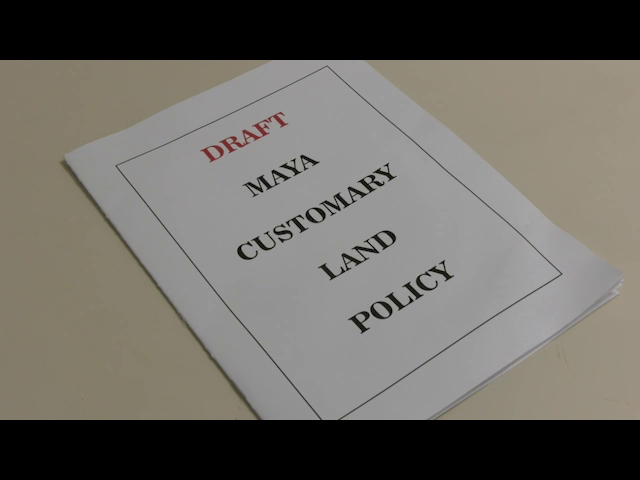
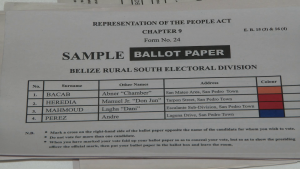
Facebook Comments